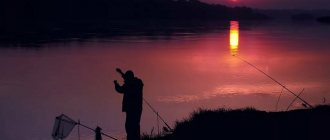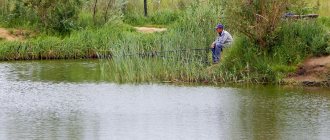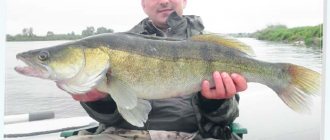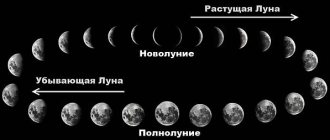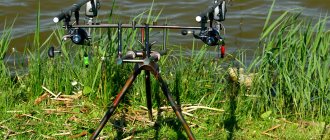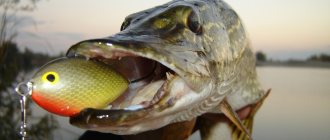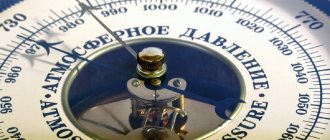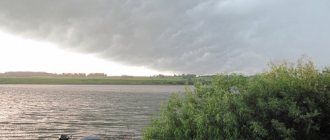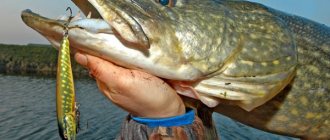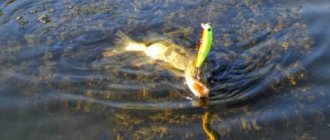Pisces sense the upcoming weather change with amazing accuracy. For example, if bad weather suddenly approaches, carp and catfish often begin to splash in the ponds. Undoubtedly, the weather has a huge impact on the fish bite. Underwater inhabitants have to constantly adapt to changes in wind, pressure, temperature, etc.
The influence of temperature on the bite
Fish do not like heat , so they try to avoid warm water by going down to the bottom. So you can’t expect a bite in warm water. Only a fry or a fish not sophisticated in life can become prey.
small fish
it is best to go fishing , when there is no heat and the water is colder and more enriched with oxygen.
During rain, the water is also well saturated with oxygen, so the catch will be large at such times. Snow can help a fisherman with his catch. If the first, still transparent ice is dusted with snow, then the fish will no longer be afraid of the fisherman, and therefore will begin to bite.
But we cannot say that a good bite will only be in water with a low temperature. Since the fish is in the water, changes in water temperature directly affect the body temperature of the fish. If the temperature rapidly drops or rises, then this harms the health of the fish, but if the transition is smooth, then this has no effect.
There is a certain temperature standard. If the temperature is lower or higher than the standard, the fish stops feeding.
Signs of good weather
Over the years, different fishermen have accumulated many different signs that can be used to predict good weather. Among these are the following:
- If there is no wind at night, and in the morning there is dew and a slight easterly breeze rises, then the weather will be good and without precipitation;
- In the evening the sun is yellow, not red. The weather will be calm and cloudless in the morning;
- If small clouds are visible during the day and practically do not move, then the weather will not worsen and they will disappear in the evening;
- When the temperature during the day and night is radically different, the weather will remain good in the following days;
- Birds fly high, seagulls often land on the water, and mosquitoes gather in flocks, then the weather will be good;
- Bees begin to fly out early in the morning - this is a good sign of stable and favorable weather for fishing;
- If the fish often jumps out of the water during the day and the frogs behave quietly, then tomorrow the weather will be normal;
- In the evening, during the warm season, there is practically no wind and sounds are clearly audible from the opposite shore, and larks actively sing - this is a harbinger of good weather tomorrow
- If the sun at sunset and the moon when it appears in the sky have a slightly irregular shape, then in the morning the weather will be favorable for fishing.
In autumn, in September, summer signs still work. As October approaches, the temperature drops. But these days can be the most productive for spinners. Asp, pike and pike perch are especially well caught. The main thing is that there is no strong wind during the day, and let the weather be partly cloudy. A good sign at this time is a flying web. This is a sure sign of the coming Indian summer. Similar days are coming, during which small roach, bream, bream and even carp are successfully caught.

Naturally, these are not all the signs. There are many other sightings, particularly for ice fishing. But they require separate consideration and analysis.
Fish at night or during the day?
The bite depends not only on the time of year, but also on the time of day. In autumn and spring, when the water temperature is at the same thermometer mark, the bite is stable at any time of the day. In summer, during the day there is practically no bite, because the water heats up, but in the evening and in the morning, as the temperature drops, there is a bite.
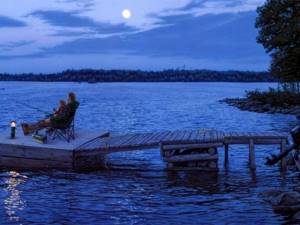
evening fishing
Signs of bad weather
There are also many signs that can help predict inclement weather. Here are the main ones:
- If in warm weather the wind increases and becomes gusty, then there is a high probability of bad weather with rain;
- When during the day clear weather gives way to cloudy weather and the wind increases in the evening and does not stop at night, then in the morning the weather will most likely worsen;
- Atmospheric pressure drops sharply in the summer, which means waiting for a cyclone and rainy weather;
- If massive clouds move in from the west or south and the wind intensifies, becomes gusty and does not pass by night, then a cyclone should be expected in the coming days;
- Before a thunderstorm, the wind can often change direction and speed. In summer, after a thunderstorm, the weather often improves, and in autumn and early spring, the wind often increases and partly cloudy weather is observed;
- On summer days, the night temperature is practically the same as the day temperature, and the weather is windy. This is a harbinger of impending bad weather. The bite weakens at this time, it becomes stuffy and there may be persistent rain in the morning;
- If at sunset the sun is red and there are elongated clouds near it, then in the morning windy and changeable weather is most likely expected. A good bite in such cases is not guaranteed;
- On a summer morning there is no dew, which means the weather may worsen during the day;
- If it is very hot during the day and stuffy in the evening and at night, then the next day you should expect the weather to worsen;
- If in the summertime worms are actively crawling out of the ground and there are a lot of leeches on the shore, toads are moving away from the reservoir, swallows are hovering low above the ground, mosquitoes sting strongly, then with a high probability we can expect worsening weather with prolonged rains.
- If the coals in the fire are very bright, then bad weather can be expected in the morning;
- The cry of crows does not promise good weather in autumn and summer;
- If in summer cirrus clouds appear in the sky, which gradually gather into one whole, and the speed of their movement increases, then you should expect rainy weather. With such phenomena, the pressure drops, and at night it is practically not cold;
- The bees do not want to fly out or fly, but not so actively, the frogs croak loudly, and the salt and tobacco become damp, then the morning will be rainy.
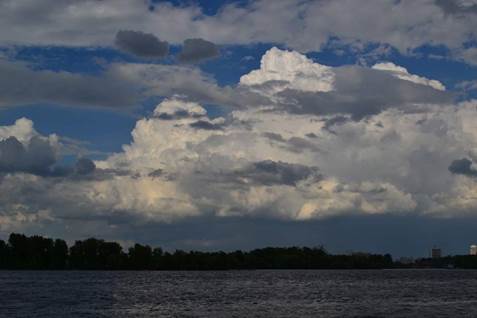
These signs do not always mean that the bite will be bad. In the hot summer months, sometimes rain and a decrease in temperature, on the contrary, lead to an improvement in the bite. It is especially pleasant to fish when there is a monotonous light rain, it becomes quite fresh, and there is no stuffiness. On such days, you can be content with rare outings of the sun, but you can successfully catch, for example, bream with a Bolognese fishing rod along the coastal dump.
About the influence of wind
The wind also has its influence on fish, but it is very small. The fish doesn’t care where or how fast the wind blows. It changes atmospheric pressure, increasing or decreasing it. The wind annoys not the fish, but the fisherman. But because of the waves, you can miss the bite. The wind also prevents me from casting the tackle properly. A warm wind helps warm the water, and a cool breeze on a hot day does the opposite.
The effect of wind on the bite depends on the time of year. If you take a cold wind, then in the summer it will improve the bite, and in the cold season it will worsen. So it itself does not affect the fisherman’s luck, it is a sign that helps the fisherman.
In what weather does the fish bite better?
The influence of weather on fish biting, stable wind direction, atmospheric pressure and other factors are important to consider, but the season also matters. In addition, each season has the best periods for fishing. Therefore, experienced fishermen prepare their gear in advance, knowing that a favorable period will soon come.
In summer
In summer, it is best to go to the pond at dawn. The activity of aquatic inhabitants continues until lunchtime, when the sun heats the air. However, a summer day can also become fishy; fish do not go deeper in the rain, as precipitation cools the reservoir. Rain should be moderate and without strong gusts of wind.
in autumn
Autumn is the best time for fishing, as many aquatic species prefer cool weather. For fishing in the fall, it is important to decide on the weather. It should be a slight cold spell with light wind or rain. Therefore, it is better to go to the reservoir at the end of September or October.
in winter
In winter, the pond is always cold. But when the sun is shining, representatives of the fauna become more active. Positive weather factors in the morning and evening hours contribute to the bite. The worst catch is at night and in the middle of the day. However, in winter it is important to monitor the strength and direction of the wind and atmospheric pressure.
in spring
The spring months are a great time for fishing. However, you should not run to the reservoir at any time of the day, since the determining weather factors are warmth and a small amount of precipitation. When the ice begins to melt, the inhabitants of the reservoir become active. During such a period it is necessary to collect gear. Spring fishing in the rain, if it is warm and drizzling, will also produce a good catch.
Other factors
The next factor to consider when going fishing is cloudiness. When it’s high, the bite is good; when it’s low, it’s practically non-existent.
The cleanliness of the water also affects the bite. Muddy - bad bite, clean - good bite.
Changing the water level in a reservoir affects the quality of the bite. When the water level rises, the bite is low, as the fish constantly changes place. There is no bite even when the water level in the reservoir rapidly decreases, since the water tends to quickly change temperature.
Fishermen are divided into two types: the first speak in a low voice even on the shore, for fear of scaring the fish, while the second, on the contrary, behave noisily. In fact, the fish have difficulty hearing sounds, which are completely repelled by the water. And the fish hears very well all the sounds that arise on or in the water and sharp sounds.
How wind speed and direction affect fish
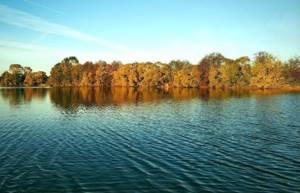
Wind speed and direction are the most important guidelines for an angler. At the time of Sabaneev, it was believed that the western and southern winds were considered the best for catching “white” fish. The northern one is a little worse and the eastern one is quite bad.
However, by today's standards this statement is not entirely true. If the wind is of medium strength, without gusts, and has been blowing in one direction for several days, then there is practically no difference whether it blows from the east, west or south.
In summer, in heavily overgrown, low-flowing reservoirs, the wind drives away the upper, oxygenated layers of water. You should plan a fishing spot there close to the shore, as a more comfortable zone for fish will be formed there.
Near the surf shore, the bottom is silted and often has a large amount of algae. In such a place, worms, larvae and other food for fish are washed away by the wave. Both peaceful and predatory fish will certainly be found here.
In a situation with a rocky or sandy bottom, most likely, the effect of the wind will be the opposite. In the absence of food, the fish will go into a “lull”, and the predator will follow it.
Recommended reading: How to distinguish carp from carp
Wind is of great importance in other situations:
- Most of the oxygen enters water from the atmosphere. The main factor for the comfort of underwater inhabitants is the temperature of the water and the mixing of its layers. The wind constantly mixes different layers of reservoirs, saturating the water with oxygen. The cooler the water (within certain limits), the more and faster it will absorb oxygen.
- Fish species such as chub or trout are most likely to be found along the leeward “shady” shore. A large number of insects will be brought here along the surface of the reservoir. This means there will be a lot of small fish here. The predator is always close to food items.
Strong squally winds greatly reduce the bite of all freshwater fish without exception. Here the direction and temperature of the air no longer matter.
Weather for fishing depending on the time of year
- Spring fishing is best done in sunny weather, but in May you can catch a lot of fish even in cloudy weather.
- Summer fish bite should be expected when the wind blows from the south or southwest, during an anticyclone. In summer, the best fishing is early in the morning and late in the evening, before and after a thunderstorm.
- In autumn it bites well during the short “Indian summer”, before the autumn slush. Most fish are not caught at all if there is a piercing north wind blowing. But in this weather, autumn burbot can be caught just fine at night.
- Winter fishing becomes successful when there is light frost without strong winds and there is a thaw.
Fish biting - reservoir conditions
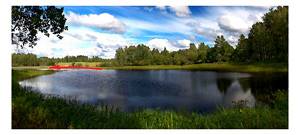
No less than the weather, the fish bite depends on the condition of the reservoir. Let’s say that in a shallow lake overgrown with algae, fish experience a catastrophic lack of oxygen even in summer.
The condition of the reservoir is especially noticeable within a couple of weeks after freeze-up in winter or during intense summer heat. It is clear that if the condition of the reservoir critically deteriorates, the fish will clearly not be able to bite.
And in the neighboring, deep, closed reservoir connected by an erik (see arrow in the picture) with springs gushing from the bottom, the fish bite can be excellent all year round. There, the state of the lake promotes active fishing.
Although the most ideal condition for biting fish is a deep reservoir, not only in summer, but also in winter, we can, without thinking, bring it to a critical state ourselves.
In my practice, after the ice melted on rivers, I had to visit large lakes that during the winter were so oversaturated with bait that by the beginning of spring the fish in them were simply choked, covering the bottom with a silvery layer. With a closed reservoir in such a state, you can’t even dream of a good fish bite for several years to come.
Fish nutrition and weight
Fish feed in different ways, but there is a mandatory rule for everyone - the one who moves is obliged to eat, therefore the consumption of energy reserves directly depends on the supply of fuel food to the living organism.
Some of the fish eat only plant food, others eat animal food, and still others, whatever comes along its route, since each type of fish has adapted to eat a certain type of food.
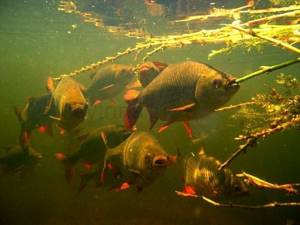
- Thus, bluefish and sabrefish, whitefish and bleak feed on small plankton, that is, the smallest organisms living in the water column.
- Crucian carp and tench, bream and roach, carp and ruffe, gudgeon and silver bream - feed on benthos, that is, organic remains found in the bottom silt at the bottom of reservoirs - worm-like mosquito larvae (red bloodworm), small crustaceans (daphnia and cyclops), shells, worms and algae.
- Fish such as rudd, roach and podust prefer plant foods
- Predatory fish - pike and perch, catfish and burbot, salmon and pike perch - eat live fish and crayfish, but sometimes also coastal shells.
- Trout and chub, dace and grayling mainly catch insects falling on the water, flying or crawling on trees and bushes, fatty worms and dragonfly larvae.
- A bottom dweller, the ruffe eats worms, bloodworms, and the eggs of various fish deposited on the bottom of the reservoir.
True, with age, the composition of their food may change, as their state of the body and living conditions change, which significantly affects the intensity of nutrition.
It is not so easy for fish to get enough food for themselves. For example, in the tightly packed stomach of a whitefish weighing 2 kilograms, up to 50 thousand tiny crustaceans were found. A pike half a meter long often contains up to a dozen decent crucian carp. The larger the body of water and the higher the water temperature, the more varied food there is for various freshwater fish.
The weight of fish also varies greatly. So, in the Caspian Sea there are huge beluga whales weighing 1500 kilograms! Catfish 2-2.5 meters long and pike weighing up to 30 kilograms are caught. These are all predatory fish.
And such peaceful fish as crucian carp, tench and roach rarely reach an optimal weight of just over 500 grams.
The most unfavorable situation
In any weather there will be fish that will be caught, although they may not be as active as under other conditions. The list of the most unfavorable weather factors for fishing includes:
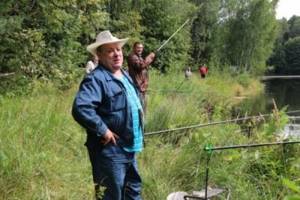
- sudden cold snap;
- precipitation lasting several days;
- very low or very high atmospheric pressure;
- abnormal heat;
- storm wind.
Atmosphere pressure
Atmospheric pressure changes several times throughout the day. But this does not particularly affect the activity of the fish. When atmospheric pressure changes, the density of water and its state change, so the fish is lost in space at some point.
But if the atmospheric pressure drops sharply, the fish will feel it and the bite will worsen, especially for bottom fish. When the mercury column rises, the fish go to the bottom, and when the pressure decreases, they rise closer to the surface of the water.
With a sharp increase in the mercury column, the fish bite becomes much more active, the bottom fish come closer to the shore, to the upper layers of the water. The larger the fish, the more painful it is to tolerate changes in mercury levels.
Pressure affects fish after 10 am. With increased pressure, activity increases in the following fish: bream, roach, silver bream, perch, and others. Predatory and bottom fish are not active at this moment. At low pressure, the following predatory fish are caught: catfish, pike perch, pike.
